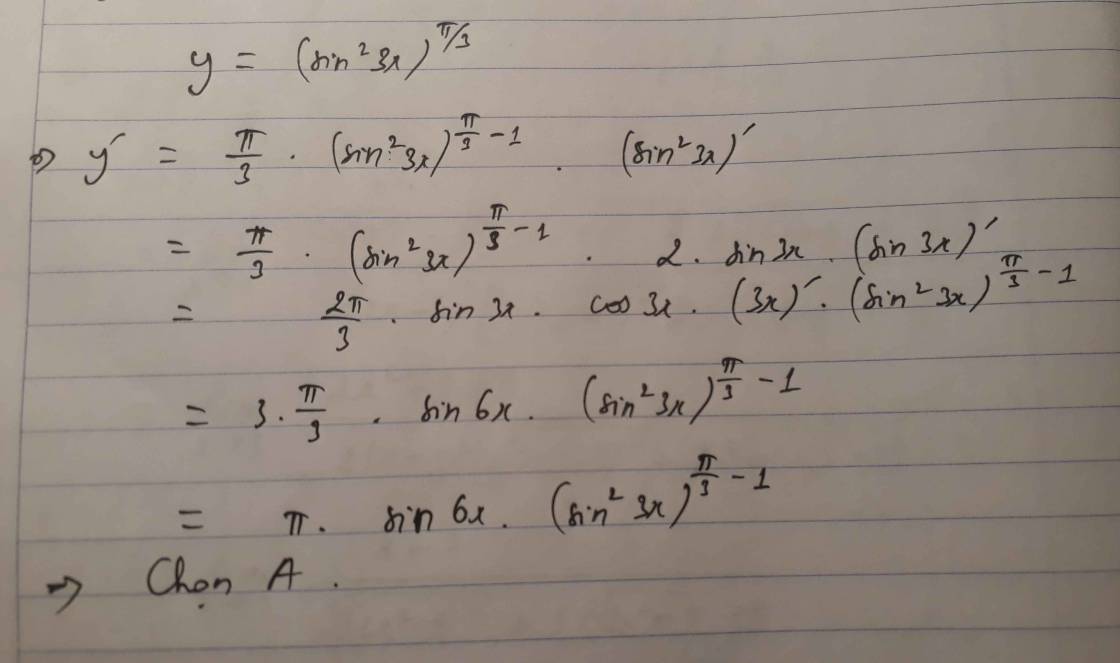viết số pi ( \(\pi\))
Hãy nhập câu hỏi của bạn vào đây, nếu là tài khoản VIP, bạn sẽ được ưu tiên trả lời.


a) Ta có cơ số \(a=0,3<1\) và \(3,15>\pi>\frac{2}{3}>0,5\)
Nên thứ tự tăng dần là :
\(0,3^{3,15};0,3^{\pi};0,3^{\frac{2}{3}};0,3^{0,5}\)
b) Vì số mũ \(\pi>0\) nên hàm số lũy thừa \(y=x^{\pi}\) luôn đồng biến. Mặt khác :
\(\frac{1}{\sqrt{2}}<\sqrt{2}<1,8<\pi\)
Nên thứ tự tăng dần là :
\(\left(\frac{1}{\sqrt{2}}\right)^{\pi};\sqrt{2^{\pi}};1,8^{\pi};\pi^{\pi}\)

Do \(\left( { - 2\pi ; - \pi } \right) = \left( { - 2\pi ;\pi - 2\pi } \right)\) nên hàm số \(y = \cos x\) nghịch biến trên khoảng \(\left( { - 2\pi ; - \pi } \right)\)

Trên \(\left(-\dfrac{\pi}{2}+k.2\pi;\dfrac{\pi}{2}+k.2\pi\right)\) chọn 2 giá trị của x (x1 và x2) sao cho x1 > x2
Xét f(x1) - f(x2) = sinx1 - sinx2
= 2cos\(\dfrac{x_1+x_2}{2}\) . sin \(\dfrac{x_1-x_2}{2}\)
Do \(\dfrac{x_1+x_2}{2}\in\left(0;\dfrac{\pi}{2}\right)\)
⇒ cos\(\dfrac{x_1+x_2}{2}\) > 0
Mà \(sin\dfrac{x_1-x_2}{2}\) > 0
nên f(x1) - f(x2) > 0
Vậy đồng biến
Nghịch biến tương tự
tại sao \(\dfrac{x_1+x_2}{2}\in\left(0;\dfrac{\pi}{2}\right)\)ạ ?

\(\Leftrightarrow cos2x+1+2cos^22x-1=0\)
\(\Leftrightarrow cos2x\left(2cos2x+1\right)=0\)
\(\Leftrightarrow\left[{}\begin{matrix}cos2x=0\\cos2x=-\dfrac{1}{2}\end{matrix}\right.\)
\(\Leftrightarrow\left[{}\begin{matrix}2x=\dfrac{\pi}{2}+k\pi\\2x=\pm\dfrac{2\pi}{3}+k2\pi\end{matrix}\right.\)
\(\Leftrightarrow\left[{}\begin{matrix}x=\dfrac{\pi}{4}+\dfrac{k\pi}{2}\\x=\pm\dfrac{\pi}{3}+k\pi\end{matrix}\right.\)
Không nghiệm nào trong 4 đáp án đúng
Hoặc là đề sai, hoặc là đáp án sai

\(a,y'=\left(tanx\right)'=\left(\dfrac{sinx}{cosx}\right)'\\ =\dfrac{\left(sinx\right)'cosx-sinx\left(cosx\right)'}{cos^2x}\\ =\dfrac{cos^2x+sin^2x}{cos^2x}\\ =\dfrac{1}{cos^2x}\\ b,\left(cotx\right)'=\left[tan\left(\dfrac{\pi}{2}-x\right)\right]'\\ =-\dfrac{1}{cos^2\left(\dfrac{\pi}{2}-x\right)}\\ =-\dfrac{1}{sin^2\left(x\right)}\)

3,14 đó bạn
số pi=3,14